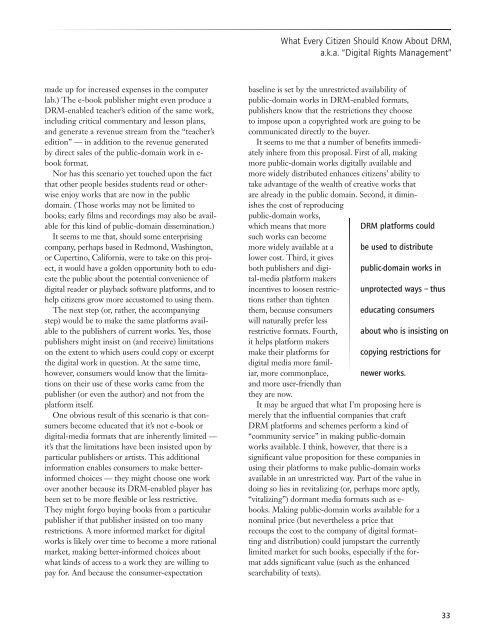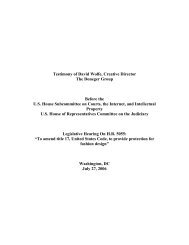What Every Citizen Should Know About DRM, aka - Public Knowledge
What Every Citizen Should Know About DRM, aka - Public Knowledge
What Every Citizen Should Know About DRM, aka - Public Knowledge
You also want an ePaper? Increase the reach of your titles
YUMPU automatically turns print PDFs into web optimized ePapers that Google loves.
<strong>What</strong> <strong>Every</strong> <strong>Citizen</strong> <strong>Should</strong> <strong>Know</strong> <strong>About</strong> <strong>DRM</strong>,a.k.a. “Digital Rights Management”made up for increased expenses in the computerlab.) The e-book publisher might even produce a<strong>DRM</strong>-enabled teacher’s edition of the same work,including critical commentary and lesson plans,and generate a revenue stream from the “teacher’sedition” — in addition to the revenue generatedby direct sales of the public-domain work in e-book format.Nor has this scenario yet touched upon the factthat other people besides students read or otherwiseenjoy works that are now in the publicdomain. (Those works may not be limited tobooks; early films and recordings may also be availablefor this kind of public-domain dissemination.)It seems to me that, should some enterprisingcompany, perhaps based in Redmond, Washington,or Cupertino, California, were to take on this project,it would have a golden opportunity both to educatethe public about the potential convenience ofdigital reader or playback software platforms, and tohelp citizens grow more accustomed to using them.The next step (or, rather, the accompanyingstep) would be to make the same platforms availableto the publishers of current works. Yes, thosepublishers might insist on (and receive) limitationson the extent to which users could copy or excerptthe digital work in question. At the same time,however, consumers would know that the limitationson their use of these works came from thepublisher (or even the author) and not from theplatform itself.One obvious result of this scenario is that consumersbecome educated that it’s not e-book ordigital-media formats that are inherently limited —it’s that the limitations have been insisted upon byparticular publishers or artists. This additionalinformation enables consumers to make betterinformedchoices — they might choose one workover another because its <strong>DRM</strong>-enabled player hasbeen set to be more flexible or less restrictive.They might forgo buying books from a particularpublisher if that publisher insisted on too manyrestrictions. A more informed market for digitalworks is likely over time to become a more rationalmarket, making better-informed choices aboutwhat kinds of access to a work they are willing topay for. And because the consumer-expectationbaseline is set by the unrestricted availability ofpublic-domain works in <strong>DRM</strong>-enabled formats,publishers know that the restrictions they chooseto impose upon a copyrighted work are going to becommunicated directly to the buyer.It seems to me that a number of benefits immediatelyinhere from this proposal. First of all, makingmore public-domain works digitally available andmore widely distributed enhances citizens’ ability totake advantage of the wealth of creative works thatare already in the public domain. Second, it diminishesthe cost of reproducingpublic-domain works,which means that more <strong>DRM</strong> platforms couldsuch works can becomemore widely available at a be used to distributelower cost. Third, it givesboth publishers and digital-mediaplatform makerspublic-domain works inincentives to loosen restrictionsrather than tightenunprotected ways – thusthem, because consumers educating consumerswill naturally prefer lessrestrictive formats. Fourth, about who is insisting onit helps platform makersmake their platforms for copying restrictions fordigital media more familiar,more commonplace, newer works.and more user-friendly thanthey are now.It may be argued that what I’m proposing here ismerely that the influential companies that craft<strong>DRM</strong> platforms and schemes perform a kind of“community service” in making public-domainworks available. I think, however, that there is asignificant value proposition for these companies inusing their platforms to make public-domain worksavailable in an unrestricted way. Part of the value indoing so lies in revitalizing (or, perhaps more aptly,“vitalizing”) dormant media formats such as e-books. Making public-domain works available for anominal price (but nevertheless a price thatrecoups the cost to the company of digital formattingand distribution) could jumpstart the currentlylimited market for such books, especially if the formatadds significant value (such as the enhancedsearchability of texts).33





